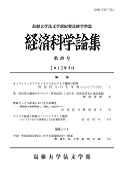島根大学法文学部
ISSN:0387-7310

ダウンロード数 : ? 件
この文献の参照には次のURLをご利用ください : https://ir.lib.shimane-u.ac.jp/2151
経済科学論集 20
1994-03-31 発行
Workers' Health and Working Conditions in Japan, the United States and Europe : A Trial of Statistical Comparison
藤岡 光夫
内容記述(抄録等)
Continuous overwork often results in the occurence of cardiovascular diseases that are typical work-related diseases. Karoshi, sudden death from overwork, is a possible end result. A direct factor leading to overwork is long working hours. Moreover, overwork is closely related to the wage level per hour, the pressure of unemployment or underemployment and high living costs. Both in Japan and the United States, working hours are very long when we compare them to Europe. Annual paid leave in both countries is exceedingly short. Earnings per hour in Japan are relatively low. The living standard in the U.S. is at a high level. The "unemployment-and-underemployment" rates in both countries are higher than the former F. R. of Germany. Regarding work-related diseases, occupational injury statistics turned out to be useless for the comparison between Japan, the U.S. and Europe. It is also difficult to use occupational mortality statistics for the comparison. General mortality statistics revealed that for the middle-aged male population, the highest death rate caused by heart diseases was in the U.S, and the highest rate caused by cerebrovascular disease was in Japan. Regarding these causes, the "ratio of middle-aged mortality" was at a high level in both countries. It means that some factors, which may be related to overwork, prevent a decrease in mortality in this age group.
Other Article
